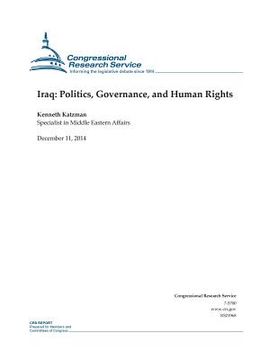Reseña del libro "Iraq: Politics, Governance, and Human Rights (en Inglés)"
Since the 2011 U.S. military withdrawal from Iraq, reemergent sectarian and ethnic divisions have fueled a major challenge to Iraq's stability and to Iraq's non-Muslim minority communities. Many of Iraq's Sunni Arabs are willing to support even radical Sunni Islamist insurgents if doing so will reduce Shiite political domination. Iraq's Kurds have been separately embroiled in political and territorial disputes with Baghdad, particularly the Kurds' intent to separately export large volumes of oil produced in the Kurdish region. The political rifts-which were largely contained by the U.S. military until 2011-erupted in December 2013 into a sustained uprising led by the extremist group Islamic State, formerly known as the Islamic State of Iraq and the Levant (ISIL). The group and its allies took control of several cities in Anbar Province in early 2014 and captured Mosul and several other mostly Sunni cities in June 2014, accompanied by a partial collapse of the Iraqi Security Forces (ISF). The crisis has had some potentially serious consequences for Iraq's long-term future. The ISF collapse enabled the Kurds to seize control of the long-coveted city of Kirkuk and its crucial oil fields. And, the crisis has caused Shiite militia forces to revive; they are politically aligned not only with dominant Shiite factions in Iraq but also with Iran. These forces have helped defend Baghdad and other areas to compensate for the weakness of the ISF, but the militias have also reportedly committed human rights abuses against many Sunnis and reinforced Sunni resentment of the Iraqi government. The Islamic State's gains in Iraq have prompted a U.S. military response in Iraq and formulation of a broader strategy, articulated by President Obama on September 10 to try to defeat the Islamic State. The President's speech came as a new government headed by Shiite Prime Minister Haydar al-Abbadi was inaugurated in Iraq. U.S. officials assert that Abbadi's government is more inclusive of Sunnis than was the government of ex-Prime Minister Nuri al-Maliki, but many Sunnis apparently seek to assess his actions over an extended period of time before giving him their support. However, the government has reached a crucial agreement with the Iraqi Kurds over Kurdish oil exports, earning U.S. and other praise for inclusiveness and compromise. President Obama states that he has ruled out reintroducing U.S. combat troops to Iraq (or Syria). Since the crisis began in June, the Administration has authorized deployment of up to 3,000 military personnel to assess, advise, and train the ISF; gain intelligence on the Islamic State; and protect American personnel and facilities. Since early August, U.S. forces have been conducting air strikes against Islamic State positions in Iraq to assist efforts by Baghdad and the Kurds to reverse Islamic State gains and relieve IS pressure on Iraq's religious minorities. The Iraqi government is also receiving substantial military assistance from Iraq, helping Baghdad confront Islamic State power but also aggravating resentment by Iraq's Sunnis. The Administration has held discussions with Iran diplomatically on restoring stability to Iraq, but has repeatedly ruled out any direct cooperation with Tehran in Iraq. The Islamic State crisis upended what had been a relatively stable situation at the time U.S. forces left in December 2011. The last U.S. troops departed then in keeping with a November 2008 bilateral U.S.-Iraq Security Agreement (SA). At the time of the U.S. departure, the United States and Iraq had agreed to continue a number of security cooperation programs, including U.S. training for the ISF through an Office of Security Cooperation-Iraq (OSC-I) and a State Department police development program. However, those programs languished as Iraqi leaders sought to end U.S. political and military tutelage. Please see CRS Report R43612, The "Islamic State" Crisis and U.S. Policy, by Kenneth Katzman et al.

